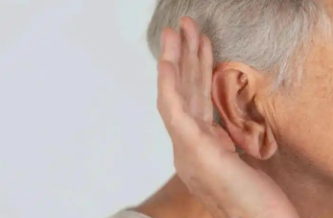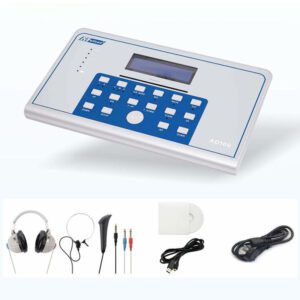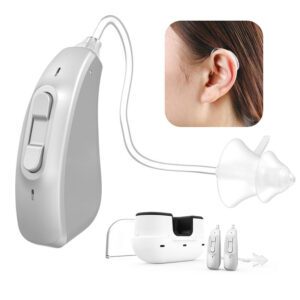hearing Aids are primarily designed to improve hearing by amplifying sounds for individuals with hearing Loss, and they can also play a role in managing tinnitus—a condition characterized by perceived ringing, buzzing, or other phantom noises in the ears. However, the relationship between hearing Aids and tinnitus is complex, and in some cases, improper use or specific circumstances might lead to the perception that hearing aids worsen tinnitus. Here’s a detailed exploration:

How Hearing Aids Generally Help Tinnitus
For many people with both hearing loss and tinnitus, hearing aids can provide relief. By amplifying ambient sounds and speech, hearing aids help “mask” or reduce the prominence of tinnitus. This is because external sounds compete with the internal noise of tinnitus, making it less noticeable. Some modern hearing aids even include built-in tinnitus-masking features, such as white noise or customizable sound therapy programs, which further distract the brain from focusing on tinnitus.
Scenarios Where Hearing Aids Might Seem to Worsen Tinnitus
While hearing aids are beneficial for most users, certain factors could contribute to a temporary or perceived worsening of tinnitus:
- Over-Amplification or Poor Fitting: If hearing aids are improperly calibrated or set to excessively high volumes, they might overstimulate the auditory system. This could temporarily heighten sensitivity to sound (hyperacusis) or draw attention to tinnitus, especially in quiet environments. A poorly fitted device might also cause feedback (whistling), which could aggravate tinnitus perception.
- Adaptation Period: New users often need time to adjust to amplified sounds. During this phase, the brain may focus more on both external noises and internal tinnitus, creating the illusion that tinnitus has worsened. This typically subsides as the brain acclimates.
- Underlying Hearing Loss Progression: If hearing loss deteriorates independently of hearing aid use, tinnitus might become more pronounced. Users might mistakenly associate this natural progression with their devices.
- Psychological Factors: Stress or anxiety related to using hearing aids (e.g., frustration with adjusting settings) can indirectly amplify tinnitus perception, as stress is a known tinnitus exacerbator.
Mitigating Risks and Best Practices
To avoid potential issues:
- Professional Fitting and Calibration: An audiologist should tailor hearing aid settings to the user’s specific hearing profile and tinnitus needs. Devices with tinnitus-masking features require precise tuning to match the frequency and intensity of the user’s tinnitus.
- Gradual Adaptation: Users should start with lower volumes and gradually increase exposure to allow the brain to adjust without overload.
- Regular Follow-Ups: Periodic adjustments ensure the device remains suited to any changes in hearing or tinnitus.
- Combined Therapies: Pairing hearing aids with cognitive-behavioral therapy (CBT) or sound therapy can address both auditory and psychological aspects of tinnitus.
Evidence and Expert Consensus
Studies generally support that hearing aids improve tinnitus-related quality of life for most users. However, a 2018 review in Frontiers in Neuroscience noted that outcomes vary, and a small subset of users may experience no improvement or transient discomfort. There is no conclusive evidence that hearing aids directly cause tinnitus to worsen permanently, but individual experiences depend on device management, auditory health, and psychological factors.
Conclusion
While hearing aids are unlikely to worsen tinnitus when used correctly, improper use, poor fitting, or coexisting conditions might create temporary challenges. Collaboration with hearing healthcare professionals is critical to optimize benefits and minimize risks. For most, hearing aids remain a valuable tool for managing both hearing loss and tinnitus.


